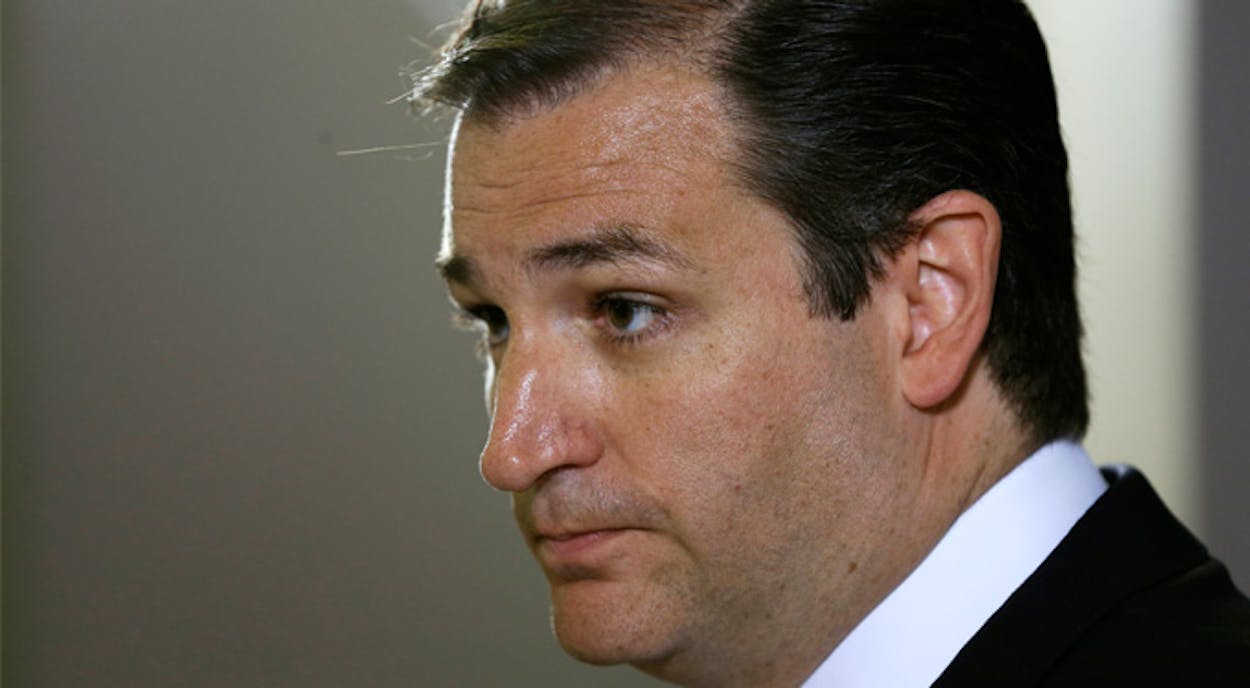For Republicans around the nation, it’s a time for choosing. And Ted Cruz, I’d say, has made his choice. His speech at the state GOP convention, on Saturday, conspicuously made no mention of Donald Trump, the party’s presumptive presidential nominee—and in an interview, about an hour before he took the stage, he explained that he hadn’t made up his mind about whether to endorse Trump or even whether to vote for him.
“At this point I’m doing what I think millions of voters are doing, which is watching and listening,” he said, before specifying what he was watching and listening for:
From the beginning our campaign was about fighting for common-sense conservative principles. I am looking for a candidate who will defend those principles—who will fight to reduce the burdens of the federal government on small businesses, which create two-thirds of all new jobs; who will reduce taxes and dramatically simplify the tax code; who will repeal Obamacare; who will protect the Constitution and the Bill of Rights—religious liberty, the Second Amendment, the Tenth Amendment—and keep our country safe. I’m looking for a commander-in-chief who we can trust to stand with the men and women who risk our lives to defend us; who we can trust to stand with our friends and allies, including, especially, the nation of Israel; and who will do what is necessary to defeat radical Islamic terrorism.
In much of the media speculation these issues are viewed through the prism of personality. I think substance matters far more. And you learn a great deal about what a candidate believes, and about their character, during the course of a campaign. And so at this point I will continue to watch and listen carefully to what the candidates say and how they conduct themselves.
Emphasis added. As the Texas Tribune’s Patrick Svitek put it, after his own sit-down session with Cruz, the man is clearly in no rush to endorse Trump. I’d take that a step further. It’s theoretically possible, I suppose, that Trump can, over the next six months, win the senator over. But by the time Cruz was halfway through his answer I saw that Trump’s hopes of doing so were hopeless.
“You can watch and listen,” I said, “but if the decision comes down to, ‘who can be trusted’ to do anything? Past behavior is predictive of future behavior. So to me that would imply that you might end up without a candidate at all.”
Cruz went oddly silent for a moment, as he did in 2013, when I observed that he sure sounded like he was planning to run for president in 2016. Then, rather than disagreeing, he offered a banal observation about the Gregorian calendar: “We have six months to watch the campaign.”
There is nothing particularly ambiguous about this answer. Since suspending his campaign, on May 3rd, I’ve had the impression that Cruz is in a bit of a “bearded Al Gore” phase, and he seemed subdued one-on-one, or even, like a normal human would be, drained. But if Cruz was sulking, or withholding his support with an eye on encouraging Trump to make a deal, he would surely have left himself more latitude for an eventual endorsement. Instead, he specified a series of lofty standards that he expects a presidential candidate to meet, knowing full well that Trump struggles to meet standards, and visibly resents expectations. He later made no distinction between Trump and the presumptive Democratic nominee, Hillary Clinton, when offering the following observation: “I fear that our nation may be facing four very challenging years.” It’s true that Cruz didn’t explicitly condemn Trump, but that may have been because he already did so, on the day of the Indiana primary, hours before he suspended his campaign, when he described his party’s presumptive presidential nominee as “amoral,” a “narcissist,” and “a pathological liar.”
Last year, of course, Cruz had described Trump as “bold,” “brash,” and, on one occasion, in August, as “terrific.” As I wrote at the time, I thought that was an error of judgment on his part, and I still do. In retrospect, though, Cruz makes for an interesting contrast with many of his colleagues. “The millions of Trump supporters—I understand their frustration and rage,” he said on Saturday. “I understand their fury at being betrayed, over and over and over again, at being lied to by politicians in both parties. And we saw a candidate who seemed to be a vessel for that rage.” He recognized Trump’s political appeal earlier on, in other words, and responded with an eye toward his strategic goals rather than his values or principles. He deserves criticism for that. But so too do many of his critics in the Republican party—all too many of whom are now, after nine more months of this lurid spectacle, making an even more cynical bargain, and one that Cruz, clearly enough, is unwilling to accept. It’s like he said. You learn a lot about a candidate over the course of a campaign.







